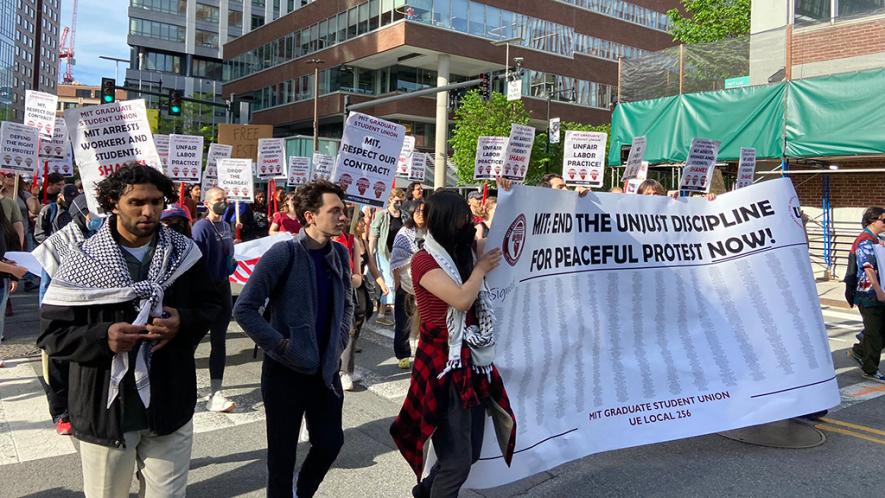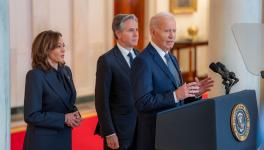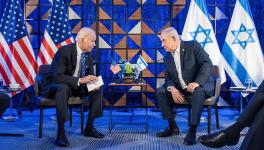US: MIT Targeting Pro-Palestine Students and Faculty

MIT Graduate Student Union members march in solidarity with pro-Palestine students facing disciplinary measures (Photo: MIT GSU)
The Massachusetts Institute of Technology has taken severe measures to suppress the voices of two prominent pro-Palestine activists on campus: PhD student Prahlad Iyengar and Dr. Michel DeGraff, a professor who has taught linguistics at the university for over 28 years.
Iyengar has been banned from campus, which is also his place of work, without due process. He has also been denied union representation by MIT’s administration, despite himself being a union steward. He faces imminent threat of suspension as well as expulsion. MIT prohibited Dr. Degraff from teaching a course on Palestine, suspended his annual pay raise, and had his official status at the university changed from “Professor of Linguistics” to “Faculty-at-Large,” also without due process.
Iyengar, a second year PhD student and a union steward at the MIT Graduate Student Union, has been active in the student movement demanding that MIT divest from Israeli genocide. The heavy disciplinary measures against him came after he authored a piece entitled “On Pacifism,” which critiqued strategies of pacificism in social movements. After the publication of the piece, MIT launched a campaign of repression against Iyengar, citing “concern for [the] safety and well-being,” of those on campus—labeling Iyengar as a “student-terrorist.” MIT also banned the publication in which Iyengar’s piece was published, which is entitled “Written Revolution,” sparking protest within the MIT community.
Professor Michel DeGraff joins Iyengar in battling suppression of activism on campus. DeGraff is the sole Black professor at MIT’s Linguistics department, and is distinguished in his field, which he has taught at the institution for over 28 years.
Since December of 2023, when DeGraff submitted a request to teach a course entitled, “Language & Linguistics in Decolonization & Liberation Struggles in Haiti, Palestine & Israel,” he has been in a near-constant battle with the university. MIT has not only moved to block the course from ever being taught, it has implemented punitive action against Dr. DeGraff himself.
As a result of these unprecedented actions against two prominent figures in the pro-Palestine movement on campus, the MIT community has banded together to launch a petition, demanding that the institution end its campaigns of punishment against both Iyengar and DeGraff, as well as “publicly commit to upholding the academic freedom of all MIT community members and protecting them from discrimination and political censorship in their scholarship, teaching, and advocacy.”
Thus far, over 2,000 individuals have signed onto the petition, organized by the MIT Coalition for Palestine.
MIT community united to demand divestment
MIT’s suppression of the student movement goes hand in hand with that of other universities throughout the country, who have called police to arrest and brutalize student protesters, while allowing right-wing Zionist mobs to assault those same students.
At MIT, a longstanding demand of the Palestine solidarity movement on campus has been divestment from Israeli genocide—a demand that has seen overwhelming support on campus and gained significant strength following both October 7 and the upsurge of the student movement in early April.
On April 19, the MIT Graduate Student Union adopted a resolution calling for a permanent ceasefire in Gaza as well as calling on MIT to sever “all research and financial ties with the Israeli military.” The resolution passed with over 70% of MITGSU membership voting in favor. This came shortly after the MIT Undergraduate Association passed a very similar resolution with the support of over 63% of MIT undergraduates who voted.
The MIT Coalition for Palestine, which includes Written Revolution, the MIT Coalition Against Apartheid, MIT Alumni for Palestine, and many other organizations, has compiled research, based on documents issued by MIT itself, that shows that the university not only has links to Israeli academic institutions, but works directly with the Israeli Ministry of Defense to advance its military technology. Campus activists are demanding that MIT ensure that the Israeli Ministry of Defense no longer directs or is a primary sponsor of any research project on campus.
“MIT’s relationship with the Israeli military apparatus includes special programs such as the Lockheed Martin seed fund, while Elbit, a member of MIT’s Industrial Liaison Program, manufactures many of the bombs that have destroyed every one of our peer institutions in Gaza, and continue to fall on displaced people,” MITGSU wrote earlier this year. Some of the projects that are run and researched at MIT but directed and sponsored by the Israeli Ministry of Defense include autonomous robotic swarms (LIDS), algorithms for pursuit-evasion strategies (which have been used for aerial drone bombings, surveilling protests, and tear gas during home demolitions) and underwater persistent monitoring (used for monitoring urban congestion in Gaza).
According to Iyengar, MIT’s ties with what he calls “war profiteers” runs deep, and arms manufacturing companies are even present at the university’s career fairs for students (although Lockheed Martin was successfully evicted from MIT’s Fall Career Fair this year following student protest). MIT also maintains direct relationships with Lockheed Martin and other weapons companies including Elbit Systems, Raytheon, and Boeing through its Industrial Liaison Program (ILP).
These weapons companies “have direct access to students,” Iyengar outlined in an interview with Peoples Dispatch. “They have direct access to events on campus. They have the ability to indoctrinate students and try to bring them into the fold very early on.”
Iyengar says that there is precedent for MIT cutting ties with military institutions for moral reasons. After the war broke out between Russia and Ukraine in 2022, MIT cut ties with Skoltech, a Russian technical institution.
Keeping up the struggle in solidarity with Palestine is morally paramount for Iyengar. “My institution and my country are not just complicit but fully invested in the genocide against the Palestinian people,” he says. “The compass for us is the people of Gaza. As steadfast as we have to be, the people of Gaza have to be much more steadfast.”
Based on the measures taken against both Dr. Degraff and Iyengar, MIT has not made it easy for campus activists to remain steadfast.
“Academic freedom” and MIT’s hypocrisy
What makes the political persecution of DeGraff and Iyengar so notable is in part that MIT, like other elite universities, has a stated commitment to upholding academic freedom and free speech on campus.
“Learning from a diversity of viewpoints, and from the deliberation, debate, and dissent that accompany them, is an essential ingredient of academic excellence,” wrote MIT’s Ad Hoc Working Group on Free Expression in 2022.
Iyengar himself finds this stated commitment is often only applied when MIT attempts to preserve its status quo, which involves deep academic and financial ties to Israel.
When students fight for divestment from Israeli genocide, which they did to a heightened degree when MIT established a Gaza Solidarity Encampment last spring, “academic freedom was used [by MIT] as the argument against [the student movement] to try to say that professors should be allowed to do research in whatever research area they want, that they should be allowed to take funding from whomever they want,” Iyengar articulated.
“But the minute that it comes to my expression about Palestine,” Iyengar says, “that’s when academic freedom disappears. That’s when free expression disappears. That’s when they can do things like ban me from my community, and ban me from campus without any due process.”
MIT has also claimed that listening to popular demands of divestment from Israeli genocide would amount to a breach of so-called academic freedom. In response to the successful undergraduate referendum in favor of divestment, MIT Chancellor Melissa Nobles wrote, “On the question of research funding, MIT relies on rigorous processes to ensure that all funded research complies with MIT policies and US law. Within those standards, MIT faculty have the fundamental academic freedom to pursue funding for research of interest in their fields.”
Dr. DeGraff submitted the proposal for the course which MIT moved to ban on December 5 of 2023. Dr. DeGraff makes note of this date as the same day that three elite university presidents, including MIT University President Sally Kornbluth were hauled before Congress to answer for alleged anti-semitism on campus. During this hearing, these presidents were berated by conservative members of Congress including Elise Stefanik (now President-elect Trump’s pick for Ambassador to the United Nations), for essentially not going further to persecute pro-Palestine student organizers.
At this hearing, representatives such as Stefanik essentially claimed that student chants of “intifada” at pro-Palestine demonstrations constituted calls for “genocide of Jews.” Dr. DeGraff found this “shocking,” as he outlined in an interview with Peoples Dispatch.
“If you look at the history of the term, it hasn’t meant that, and if you speak to any native Arabic speaker, it will tell you that intifada doesn’t mean killing all the Jews,” Dr. Degraff said. He took this as inspiration for his practice of teaching linguistics.
“I thought this is a topic that deserves attention from us linguists, because we have the tools to be able to make sense of all this Orwellian speech happening in Congress, happening at university, happening in the media, and doing so will help the public better understand what’s at stake and increase mutual understanding, and eventually peace,” he said.
In proposing his course, “I was shocked that the very first reaction I got was pushback,” by the administration and some of his colleagues.
“The very title was of concern. The first title that I proposed had to do with language and linguistics for decolonization and the liberation struggle,” Dr. Degraff described. “And in fact, that’s what I found out very quickly on December 8, when I had a Zoom call with my department head, I was told that the term ‘colonial’ does not apply to Israel.”
“I thought that was surprising as an argument from a semanticist, because the history is there to consult. If you look at the very founding documents of Zionism, which is the Theodor Herzl pamphlet, ‘The Jewish state,’ he clearly describes it as a Zionist project,” Dr. DeGraff articulates.
Herzl himself “talks about writing to Cecil Rhodes of Rhodesia to ask Cecil Rhodes to come help him do in the Middle East what Rhodes had done in South Africa, the colony,” outlines Dr. DeGraff.
“I never expected that linguists would see a course on linguistics for liberation and for justice to be a threat,” says Dr. DeGraff. “But now looking back, that’s my analysis. It was a fundamental threat to these narratives that really hide the cruel reality of the Zionist project.”
What does Trump’s administration have in store for the student movement?
Under a Trump administration, which has elevated the likes of Representative Stefanik to some of the highest offices, as well as chosen former Arkansas governor Mike Huckabee as Ambassador to Israel, who has once argued that there was “no such thing as a Palestinian” and recently claimed that the US would back an Israeli attempt to annex the West Bank.
Stefanik’s appointment is of particular concern to Dr. DeGraff, who expects her “to be attacking free speech and academic freedom, given her record today to go after universities for allowing students to express their opinions about what’s happening in Palestine and Israel.”
Some, including Dr. DeGraff, find it ironic that Stefanik has been elevated by the right-wing as some sort of crusader for the rights of Jewish people. “Stefanik might be one of the most rabid anti-Semites in Congress. She’s someone who has praised candidates who align themselves with Hitler,” Dr. DeGraff describes.
Such an ultra-right administration could portend an even greater crackdown on pro-Palestine student activism. But Iyengar highlights that MIT’s political persecution of the Palestine solidarity movement has happened entirely under the so-called liberal Biden-Harris administration.
“Under the Biden administration, dozens of student protesters, maybe hundreds of student protesters, were arrested,” Iyengar outlines.
“The police decided to come onto campus and brutalize students, brutalized faculty, brutalized staff, and arrested community members for free assembly and free expression. So it was not like things were rosy under the Biden administration either.”
Iyengar references his own situation. “The fact that MIT decided then to ban the distribution of ‘Written Revolution’ in which I published—that is a kind of a quintessential right-wing attack against free expression,” he described. “And MIT did that on November 1, not even after the election.”
Activists like Iyengar and Dr. DeGraff pledge to continue to fight for Palestine under a Trump administration. Iyengar uplifts the ongoing demand for an arms embargo, which enjoys wide popularity in the United States.
“We know that that resistance comes at a cost. We bear a small cost here when the institute tries to repress us. But it’s truly the cost that is being paid, unfortunately, by the Palestinian people for resisting their decades-long occupation,” Iyengar says.
“MIT has to apply its own rules, having to do with not collaborating with entities that are violating human rights and are committing crimes against humanity. So it’s really important that the public, the students, activists, journalists, that people understand what’s at stake here,” Dr. Degraff says, highlighting the importance of political expression for Palestine on campus.
“If we allow universities to shut down speech, then that’s it. Not only in this particular case with Palestine and Israel, but in the future, there won’t be much left in higher education in terms of truly open debate and truly open inquiry into truth.”
Get the latest reports & analysis with people's perspective on Protests, movements & deep analytical videos, discussions of the current affairs in your Telegram app. Subscribe to NewsClick's Telegram channel & get Real-Time updates on stories, as they get published on our website.
























